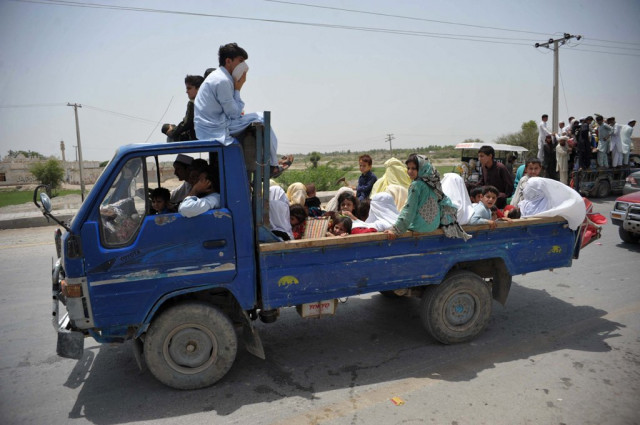Where will the IDPs go?
Country should stand united to give space and shelter to those suffering the worst from more than a decade of conflict

With the influx of IDPs, provinces fear a surge in polio cases. This is an understandable concern, but who spoke up for the children of Waziristan where there has been a ban on vaccination drives since 2012? PHOTO: AFP

Two days into the operation, Sindh unabashedly declared that IDPs will not be allowed in the province. The Balochistan government has also deployed more Frontier Corps troops at the border connecting the province to South Waziristan, in order to check the influx of people evacuating. It’s only Khyber-Pakhtunkhwa that is establishing camps for the victims, but how many IDPs will one province be able to provide shelter to? In contrast, Afghanistan is more welcoming to these displaced families.
With the influx of IDPs, provinces fear a surge in polio cases. This is an understandable concern, but who spoke up for the children of Waziristan where there has been a ban on vaccination drives since 2012? Who demanded the centre to stand up for the fight against polio as children in the Federally Administered Tribal Areas continued to be crippled for life? These are questions those against IDPs coming to their provinces must ask, and also be able to answer.
Undoubtedly, frequent natural disasters in the country and internal migrations due to conflict have made it difficult to accommodate soaring populations in urban centres, but the country as a whole must realise that neither is the war only being fought for the tribal agencies nor is the problem of terrorism and militant hideouts restricted to the Federally Administered Tribal Areas. The country stands united for a military operation and it should stand just as united to give space and shelter to those suffering the worst from more than a decade of conflict.
Published in The Express Tribune, June 20th, 2014.
Like Opinion & Editorial on Facebook, follow @ETOpEd on Twitter to receive all updates on all our daily pieces.















COMMENTS
Comments are moderated and generally will be posted if they are on-topic and not abusive.
For more information, please see our Comments FAQ